Some AI founders are landing big enterprise deals by doing something old-school: showing up, writing code, and building the perfect demo — fast.
YC partners say this strategy is taking off, and it’s straight out of Palantir’s early playbook.
Startup founders should see themselves as “forward-deployed engineers,” said Garry Tan, YC’s CEO, on an episode of the “Y Combinator” podcast published Friday.
The term, popularized by Palantir, refers to engineers who embed themselves with clients to fine-tune the product on-site.
Tan, who was Palantir’s 10th employee, said the defense tech company’s edge came from recognizing that many government agencies and Fortune 500 companies lacked deep technical expertise in the room. Palantir bridged that gap by embedding technically savvy engineers during sales and implementation.
Much of Palantir’s success comes from its business with the US government. The Department of Defense is its biggest customer, making up 41% of its fourth-quarter revenue.
Startup founders need to be “technical,” “great product people,” and even “ethnographers” and “designers,” said Tan, who worked at Palantir from 2005 to 2007.”
“You want the person on the second meeting to see the demo you put together based on the stuff you heard, and you want them to say, ‘Wow, I’ve never seen anything like that.’ And take my money,” he added.
Founders closing ‘six, seven-figure deals’
This hands-on approach is already delivering big results.
YC partner Diana Hu said she and her team have seen founders close “six, seven seven-figure deals” with large enterprises by being forward-deployed engineers.
Sometimes, she said, a pair of founders wins a deal by walking into a boardroom, gathering context, and coming back the next day with a tailored AI demo.
Once the deal is closed, some of these founders go on-site to work closely with customer support teams, continuously fine-tuning the software or language model to improve performance, said YC partner Harj Taggar.
Tan said this model gives AI startups a chance to outmaneuver giants like Salesforce, Oracle, and Booz Allen.
“You have big fancy salespeople with big strong handshakes, and it’s like, how does a really good engineer with a weak handshake go in there and beat them?” Tan said.
“It’s actually you show them something that they’ve never seen before, and like, make them feel super heard.”
Y Combinator did not respond to a request for comment from Business Insider.
Read the full article here
















